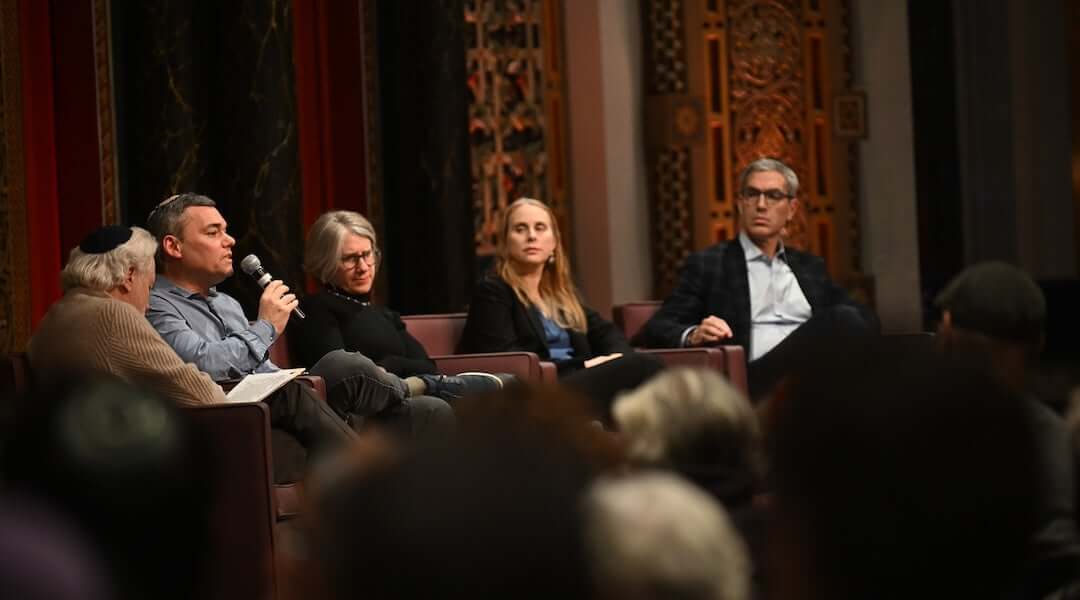August 13, 2004
Getting It Wrong
On Reform Policy
The original headline to an August 6 front-page article — the online version of the article appears under a revised headline that correctly portrays the issue — is belied by the fourth paragraph of the story, which accurately refers to “the Reform movement’s strong support for Sharon’s general plan to pull out of Gaza and parts of the West Bank” (“Reform Rips U.S. Support for Sharon Gaza Plan”; Please see editor’s note, Page 1).
I sat in the audience with thousands of delegates to the Union of Reform Judaism biennial in Minneapolis last November, when Rabbi Eric Yoffie praised Prime Minister Sharon’s courage for proposing the Gaza withdrawal plan. He was the first president of a major American Jewish organization to see the risk that Sharon was taking on behalf of the future. He and the Reform movement deserve a headline that summarizes accurately the facts contained in your own article.
Rabbi Jonathan Gerard
Temple Covenant of Peace
Easton, Pa.
The Forward’s August 6 front-page headline flagrantly mischaracterizes both Rabbi David Saperstein’s letter to Secretary of State Colin Powell and the resolution on Israel policy passed in June by the Reform movement.
Neither “Rips U.S. Support for Sharon Gaza Plan.”
In urging steps to minimize the adverse impact on Palestinians of unilateral Israeli actions and renewal of American efforts to press for peace negotiations, the Reform movement takes a position similar to that articulated by the Forward in an editorial in the same issue: “This is the time for Western leaders to stand behind Sharon, reward him when he does right and show Israeli voters that the risks they are being asked to take will bring real rewards.”
Norman Gelman
Potomac, Md.
It was with great regret that we read of the letter from Rabbi David Saperstein to Colin Powell, endorsed by Rabbi Eric Yoffie, purportedly representing all Reform Jews in America. This letter effectively urged that the United States put pressure on Israel to negotiate with the Palestinians, even though the rabbis are not sure with whom Israel should negotiate. It also questions Congress passing “one-sided resolutions” favoring Israel.
The rabbis’ timing is terrible. Israel is reeling from the unfair decision by the International Court of Justice against the Israeli security fence, and the almost unanimous vote in the United Nations General Assembly supporting this decision. Israel also must deal with the biased decision by the Presbyterian Church (USA) accusing it of apartheid and calling for divestiture of Presbyterian investments from Israel.
Instead of pointing out the unfairness of these actions — at a time when the Sudanese government receives no U.N. rebuke for the mass killings in Darfur — these rabbis call for the United States to put pressure on Israel. These rabbis, who sit in the safety of the United States, also overlook the fact that Israel is a sovereign state and needs to make its own decisions about how to protect itself and with whom and when to negotiate.
They ignore the facts. The Arabs have made it plain since Israel’s re-establishment in 1948 that they do not want peace or a two-state solution. They want the destruction of Israel. It doesn’t matter how hard Israel tries, you cannot make peace with someone who wants to kill you. The rabbis should have learned this from the Holocaust.
We hope that rabbis of Reform congregations and Reform Jews will let the “leadership” of the Reform movement and the American government know that these two rabbis speak only for themselves.
Sandor and Bunny Shuch
Phoenix, Ariz.
Remembering
Jack Spitzer
Allow me to add my reminiscences about Jack Spitzer, whom the Forward eulogized so movingly (“Jack Spitzer,” August 6). My association with him spanned both my professional and volunteer careers, and extended beyond B’nai B’rith to a range of communal endeavors — in all of which I found him to be exactly as the Forward described: a “master of good works.”
When Jack went out of office as international president of B’nai B’rith in 1982, he showed his appreciation for and gratitude to the senior staff by taking us and our spouses out to a series of dinners in Washington. I was then the director of the organization’s Israel Commission, but I also had just been elected president of the Jewish Communal Service association of North America, which Jack had noted and applauded. Because of the pressures of these multiple responsibilities, I thanked Jack for the invitation but asked to be excused. He insisted, however, on 100% participation, which ensured that the staff had a unique opportunity to engage with one another, as well as with the outgoing president.
In the 1990s, after I retired and became more involved in volunteer Jewish communal service, Jack always would inquire about my endeavors at a variety of national meetings. Upon my election as president of the Labor Zionist Alliance, he sent me a particularly warm note.
Those of us privileged to receive his annual “Spitzer Saga” reports could only marvel at the extent of his involvement in so many communal and political activities; at the partnership of his wife, Charlotte, and family in these pursuits, and at the genuine warmth he expressed about every cause he served, every coalition he supported and every colleague with whom he worked.
We are now challenged to continue all of those “good works,” but Jack Spitzer will be a hard act to follow.
Daniel Mann
Bethesda, Md.
Slave-Labor Payments Were Misunderstood
As Holocaust survivors, we are greatly appreciative that the Claims Conference, after strenuous negotiations with the German government, has achieved full payment on the second and last installment of the slave-labor compensation (“Survivors Receive $401 Million as Slave-Labor Compensation,” August 6).
Even a few thousand dollars are of great help to many survivors struggling to meet medical costs.
We concur that it was a “monumental task,” but wonder whether it was really constructive to announce to the international media that the payment was the “largest ever one-day distribution in compensation to Holocaust survivors.”
In our conversations with non-Jews, including some renowned journalists, we discerned that the general public is under the impression that all survivors received sizable compensations from Germany for their sufferings. The fact that only 130,700 survivors — out of a total survivor population of 600,000 to 800,000 — received this payment of about $3,050 each (and a total of $7,500 for years of slave labor) was underreported and would have been more informative and less provocative.
Leo Rechter
Executive Director
Nahos – National Association of Jewish Child Holocaust Survivors
Jamaica Hills, N.Y.
Restituting Property Would Help Poland
We read the August 6 article on Polish restitution with great interest (Restitution Battle Shifts to Stalled Polish Front”). It was measured in its presentation and factual.
However, I must respond to the statement of Krzysztof Kasprzyk, a spokesman for the Polish Ministry of Foreign Affairs, that Poland will suffer severe economic hardship if restitution is made. Poland faces economic hardship because of the incompetence and corruption of the political class of that country; restitution will have no adverse effect on the budget of Poland.
At present, confiscated properties, such as farms, apartments and factories, are run down, in disrepair and often derelict. The Polish government does not maintain properties, a policy that is draining the budget.
The real story is that restitution would help allow for the emergence of a Polish middle class, a phenomenon that is feared by those in power because a middle class would not vote for them.
Those who have claims for restitution face a cynical, greedy and corrupt political class in Poland that will give up absolutely nothing unless it compelled to by forces against which it cannot prevail.
Edward and Therese Walata
Chelsea, Mass.
Register for Donation
Thank you, East Village Mamele, for encouraging me to get me off my tuches and register for organ donation (“The Gift That Keeps On Living,” July 30). Perhaps someday my kishkas (but probably not my tuches) will be of use to someone.
Stephanie Aaron
New York, N.Y.
















